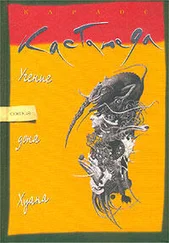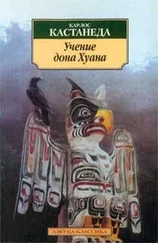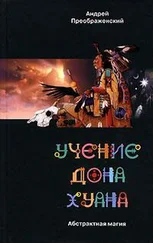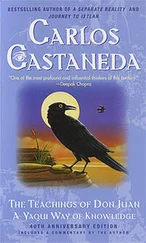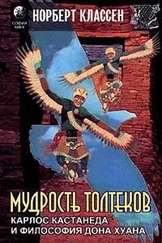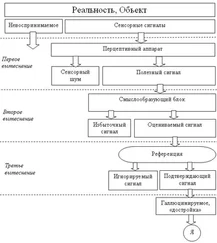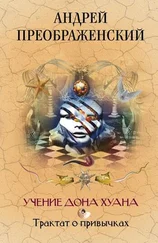| But tell me, would that make any difference?" |
А что, тут есть какая-то разница? |
| "Yes, it would. |
- Да, разница есть. |
| If it was carrying something in its mouth it was not a coyote." |
Если он что-то нес в зубах, то это был не койот. |
| "What was it then?" |
- Тогда что же? |
| "It was a man or a woman." |
- Мужчина или женщина. |
| "What do you call such people, dona Luz?" |
- А как они у вас называются, донья Лус? |
| She did not answer. |
Она не ответила. |
| I questioned her for a while longer, but without success. |
Я выспрашивал и так и сяк, но безуспешно. |
| Finally she said she did not know. |
Наконец она сказала: "Не знаю". |
| I asked her if such people were called diableros, and she answered that "diablero" was one of the names given to them. |
Я спросил, не их ли называют диаблеро. Да, ответила она, есть и такое название. |
| "Do you know any diableros" I asked. |
- А ты сама не знаешь какого-нибудь диаблеро? |
| "I knew one woman," she replied. |
- Знала я одну женщину. |
| "She was killed. |
Ее убили. |
| It happened when I was a little girl. |
Я тогда была еще ребенком. |
| The woman, they said, used to turn into a female dog. And one night a dog went into the house of a white man to steal cheese. |
Женщина, говорили, превращалась в суку, и как-то ночью забежала в дом белого, хотела стащить сыр. |
| The white man killed the dog with a shotgun, and at the very moment the dog died in the house of the white man the woman died in her own hut. |
Белый ее застрелил из ружья, и как раз тогда, когда сука сдохла в доме белого, женщина умерла у себя в хижине. |
| Her kin got together and went to the white man and demanded payment. |
Собрались ее родственники, пришли к белому и потребовали выкуп. |
| The white man paid good money for having killed her." |
За ее убийство белый выложил много денег. |
| "How could they demand payment if it was only a dog he killed?" |
- Как же они могли требовать выкуп, если белый убил всего лишь собаку? |
| "They said that the white man knew it was not a dog, because other people were with him, and they all saw that the dog stood up on its legs like a man and reached for the cheese, which was on a tray hanging from the roof. |
- А они сказали, что белый знал, что это не собака, ведь с ним были еще люди, и все они видели, как собака встала на задние лапы и, совсем как человек, потянулась к сыру, который лежал на подносе, а поднос был подвешен к кровле. |
| The men were waiting for the thief because the white man's cheese was being stolen every night. |
Они тогда ждали вора, потому что сыр того белого каждую ночь исчезал. |
| So the man killed the thief knowing it was not a dog." |
Так что белый убил вора, зная, что это не собака. |
| "Are there any diableros nowadays, dona Luz?" |
- А теперь есть диаблеро, донья Лус? |
| "Such things are very secret. |
- Такие вещи под большим секретом. |
| They say there are no more diableros, but I doubt it, because one member of a diablero's family has to learn what the diablero knows. |
Г оворят, что их уже нет, но я сомневаюсь, потому что кто-то из семьи диаблеро должен получить его знание. |
| Diableros have their own laws, and one of them is that a diablero has to teach his secrets to one of his kin." |
У них свои законы, и один из них в том и состоит, что диаблеро должен кому-то из своего рода передать свои тайны. |
| "What do you think the animal was, Genaro?" I asked a very old man. |
- Как ты думаешь, Хенаро, что это было за животное? - задал я вопрос древнему старику. |
| "A dog from one of the ranches of that area. What else?" |
- Собака с какого-нибудь местного ранчо, что же еще? |
| "It could have been a diablero." |
- А мог это быть диаблеро? |
| "A diablero? |
-Диаблеро? |
| You are crazy! |
Ты ненормальный. |
| There are no diableros." |
Они не существуют. |
| "Do you mean that there are none today, or that there never were any?" |
- Ты хочешь сказать, что теперь не существуют или вообще не существуют? |
| "At one time there were, yes. |
- Когда-то существовали, это да. |
| It is common knowledge. |
Это всем известно. |
| Everybody knows that. |
Кто ж этого не знает. |
| But the people were very afraid of them and had them all killed." |
Но люди их очень боялись и всех поубивали. |
| "Who killed them, Genaro?" |
- Кто же их убил, Хенаро? |
| "All the people of the tribe. |
- Да все племя. |
| The last diablero I knew about was S. |
Последний диаблеро, которого я знал, был С-. |
| He killed dozens, maybe even hundreds of people with his sorcery. |
Он своим колдовством извел десятки, если не сотни людей. |
| We couldn't put up with that and the people got together and took him by surprise one night and burned him alive." |
Терпение наше кончилось, как-то ночью мы собрались все вместе и взяли его врасплох, да и сожгли живьем. |
| "How long ago was that, Genaro?" |
- А давно это было? |
| "In nineteen forty-two." |
- Году в сорок втором. |
| "Did you see it yourself?" |
- Ты что, сам это видел? |
| "No, but people still talk about it. |
- Да нет, но люди до сих пор об этом говорят. |
| They say that there were no ashes left, even though the stake was made of fresh wood. |
Говорят, от него даже золы не осталось, а ведь дрова для костра были сырые. |
| All that was left at the end was a huge pool of grease." |
Все, что осталось под конец, так это большая лужа жира. |
| Although don Juan categorized his benefactor as a diablero, he never mentioned the place where he had acquired his knowledge, nor did he identify his teacher. |
Хотя дон Хуан сказал, что его учитель был диаблеро, он никогда не говорил, где получил от него знания и никогда не упоминал его имени. |

